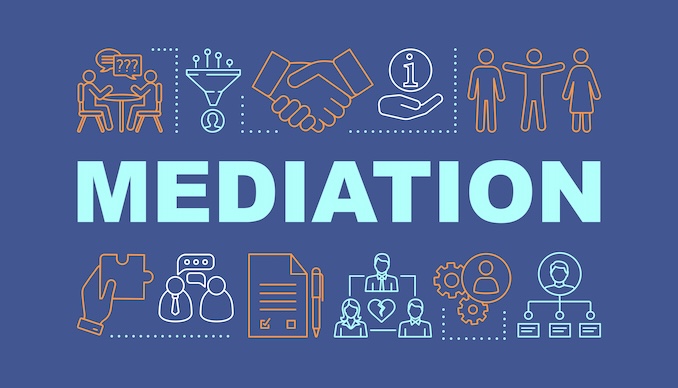Conflict is an inevitable part of life. Whether it’s a disagreement with your spouse, an argument with a friend, or a dispute at work, you all deal with interpersonal conflict on a regular basis. While some conflicts can be settled through open communication, others may require outside assistance. This is where mediation services come in.

Mediation offers an effective way to resolve conflicts between two or more parties. As per recent analysis, mediation results in resolution or settlement between 70% to 80% of the time. This approach is faster, less expensive, and can lead to better long-term relationships than going to court or arbitration.
But when is it appropriate to call on a professional mediator’s assistance? This article will provide a guide for knowing when mediation is the right approach for conflict resolution. Through this, you can make informed choices when it comes time to resolve conflicts through cooperation rather than escalation.
-
Divorce and child custody
No one anticipates just how complicated and emotionally draining divorce and child custody disputes can be. Mediation offers a better way for couples to navigate these challenging decisions. An experienced family mediator can guide sensitive conversations to keep discussions productive. They ensure both parents’ perspectives are heard when making plans for joint custody schedules, holiday divisions, child support, living arrangements, and more. Mediation meetings also create a neutral space for couples to calmly address each other’s worries and work through disagreements.
So, if you and your spouse are going through separation, divorce, or any family disputes, it’s best to avail the mediation services by Boyce Law or other trusted law firms that offer family law and mediation resolution. With divorce mediation, you can avoid the uncertainty, expense, and relationship damage of court battles. You’ll also have more direct input and control compared to leaving it all in a judge’s hands. Sure, mediation requires compromise, but it can result in win-win solutions that help you transition to positive co-parenting.
-
Workplace disagreements
Did you know that most managers spend over four hours weekly dealing with conflict in the workplace? And unfortunately, nearly 1 in 4 employees think their managers handle conflict very poorly. Keep in mind that how management chooses to address employee disputes can impact morale, turnover, and the bottom line. In this case, mediation can be an effective first step for resolving workplace issues before they escalate.
Whether it’s a conflict between coworkers, discrimination complaint, or wrongful termination claim, mediation focuses on reaching mutual understanding. Employees can be heard in a non-threatening environment, allowing them to be more involved in finding remedies that satisfy all parties. This helps rebuild working relationships, and issues can be resolved faster, reducing employee stress and lost productivity.
For management, workplace mediation reduces legal risks and negative publicity while creating an open culture. It demonstrates a genuine commitment to supporting employees. Securing resolution through mediation can be make-or-break for preserving a strong, united workforce.
-
Business disputes
Besides disagreements between coworkers, conflicts and disputes can inevitably arise even between the closest of business partners or collaborating companies. When not dealt with properly, these disputes can potentially destroy long-term business partnerships and each other’s bottom line.

Mediation allows businesses to resolve issues confidentially versus airing dirty laundry in the public court records. Its flexible process gives companies more control to craft win-win solutions not possible through litigation. Even if full agreement isn’t reached through mediation, progress is made in better framing the issues. This narrows the scope for any potential future litigation. Most importantly, mediation can repair damaged business relationships in a collaborative process that avoids escalation.
So, if you’re considering starting a business, be ready for possible disagreements with your partner and be open to the idea of mediation and peaceful resolution.
-
Neighbourhood disagreements
Having an annoying neighbour can make a home feel like anything but a sanctuary. According to FindLaw’s survey data, the top reason for neighbourhood disagreements is noise (48%), followed by pets and animals (29%), and children’s behaviour (21%). Any type of neighbourhood dispute can really escalate if not managed well.
Mediation is a wise option before matters get out of hand or require legal intervention. With this approach, the neighbours involved can directly but calmly discuss grievances in a safe and private space with the facilitation of an impartial mediator.
Sometimes, simply feeling heard goes a long way. A mediator can help feuding neighbours see each other’s perspectives and communicate in a non-confrontational manner. Mediation also enables neighbours to creatively brainstorm compromises that work for everyone, like soundproofing a shared wall or establishing pet waste cleanup schedules.
Overall, mediation promotes understanding and preserves the community connections that make a neighbourhood more than just houses stacked together.
Takeaway
When conflicts emerge, it’s wise to pause and consider if mediation may be the best recourse before things spin out of control. Not every dispute requires legal action or escalation. So, next time tempers flare at home, or differences arise with colleagues, business partners, or neighbours, think about giving mediation a chance. The simple act of people coming together to earnestly listen and seek compromise can work wonders. With some guidance and good faith effort, you may just find the conflict was less insoluble than it first appeared.

